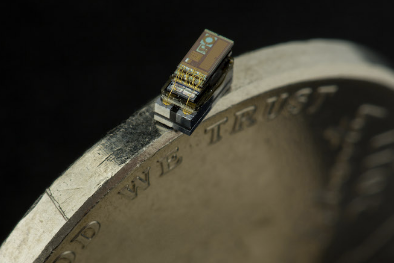The Michigan Micro Mote constitutes the first complete, operational computer system measuring as small as two millimeters across. “To be “complete,” a computer system must have an input of data, the ability to process that data – meaning process and store it, make decisions about what to do next – and ultimately, the ability to output the data.” Prof. Blaauw explained. “The sensors are the input and the radios are the output. The other key to being a complete computer is the ability to supply its own power.”
The Michigan Micro Mote contains solar cells that power the battery with ambient light, including indoor rooms with no natural sunlight, allowing the computers to run perpetually.
…
A key breakthrough in the size/power matchup came with the Phoenix processor in 2008. The Phoenix processor is miniscule at 915 x 915µm2, and boasts ultra-low operating voltage and a unique standby mode that results in an average power consumption of only 500pW. (Consider that 1pW is the average power consumption of a single human cell.)
Blaauw explained why Phoenix’s extreme energy efficiency is so important: “As you shrink down in size, the percentage of the system tends to be dominated by the battery. It’s actually not hard to make chips small, but it is hard to make them low power. We could have very small chips, but we’d still end up with really large batteries.”
With the M3, engineers at Michigan are the first to accomplish energy neutrality via indoor energy harvesting in a wireless system of its size. With a 1mm2 solar cell producing 20nW, the device can harvest enough energy under ambient light to run perpetually. The device’s standby power consumption is 2nA. That’s about a million times less power than the average mobile phone consumes while on standby, or the comparative difference between the thickness of a sheet of paper and the length of a football field
deleted by creator
deleted by creator
So what computer does not meet that definition then? They all “supply their own power” under that definition.
I’m assuming they have that criterion to distinguish from RFID-type power sources where the signal also supplies power, but I’m sure there’s some conversion of power types in that instance too.
It doesn’t say “generate” it’s own power. Just supply.
There’s literally a pc component called a power supply that supplies power to the pc.
Define computer… can or play Doom? Crysis? Minesweeper?
It’s just a matter of time before we see them sold at the boardwalk, then.
Edit: See comments under to go a bit further in why I am wrong and have a great day!
If I’m not wrong Quantic Computers where already super small, just that you needed a whole room ti cool it. And protect it from the outside
No, sadly not. If you were to argue that individual components of a quantum computer are small, you’d also have to argue just how small classical transistors are. A whole quantum computer is pretty big because of the cooling, but that’s an integral part.
Well I do understand what you say, but does the cooling count in the computing of the computer, with or without the cooling a computer would compute, just way badder, so I would tend to say it’s not counting , although I do understand what you are meaning
Without cooling, the computer doesn’t work, since it overheats (which would literally destroy it). Doubly so for quantum computers, since the quantum effects are superseded by environmental noise above their operating temperatures.
To say it differently: every computer part has cooling integrated, like your CPU. If you removed all that it would stop working after a few seconds.
Thank you, you are right indeed. Thank you for taking the time to respond
No problem! :)
But Quantum Computers cannot run without cooling, so this doesn’t work the same as with a PC





